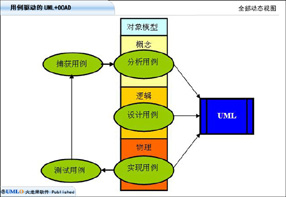|
|
|
|
|
| |
|
|
| Training Time:beijing
shanhai shengcheng According to enrollment classes
|
| Training Fees:5000yuan/person
|
| Corporate Training:
According to business needs, custom
House |
| |
Mastering Object-Oriented Analysis
and Design with Unified Modeling Language (OOAD/UML)
2.0 presents the concepts and techniques necessary
to effectively use system requirements captured
in use cases to drive the development of a robust
design model. In this intensive, hands-on workshop,
learn to apply UML 2.0 notation to fundamental OOAD
concepts, including architecture, objects, classes,
components, subsystems, stereotypes, relationships,
and supporting diagrams.
Use UML throughout the project life-cycle to capture
and communicate analysis and design decisions. Thus,
you learn UML 2.0 notation in the context of an
iterative, use case-driven, architecture-centric
process. In addition, language-specific examples
of common UML constructs are provided in a separate
appendix.

|
| |
Objectives:
|
- understand the UML correct application
methods and principles
- use UML to establish business model, requirement
model, analysis model, design model,implementation
model, testing model, deployment model
- real understanding of demand methods,
in-depth understanding of the essence use
case
- understand the use of UML & OOAD in
real projects
- use of systematic analysis model to analysis
of nature
- learn how to design solid and easily extend
structure
- master requirement and analysis design
of key skills by the actual case
- see good and bad actual cases, self-reflection
and improve
- deeper understanding how to solve the
practical development problem
- understand UML & OOAD to run through
iteration, use case-driven and in the process
of framework for the centre
- grasp on how to expand the business structure,
application architecture and program structure
based on the UML & OOAD
|
|
| Teaching
methods: |
customized course + case
to explain + Group Discussion,60% of the cases to
explain ,40% of the practice drills. |
| Training
Outline: 3 days |
Course Participants
|
Analysts, designers, and software developers,
and other practitioners, who desire an understanding
of object-oriented analysis and design concepts
and hands-on practical experience applying
the techniques within a use-case-driven, architecture-centric,
and itera tive development process.
Note: You should be currently involved in
analysis and design work or in developing
analysis and design models using UML.
|
| Required Experience |
|
| Training Objectives
|
Upon the successful completion of this course,
participants should be able to:
- Apply an iterative, use case-driven, architecture-centric
process to the development of a robust design
model
- Use UML 2.0 to represent the design model
- Apply the concepts of abstraction, encapsulation,
inheritance, and polymorphism
- Explain the different views of software
architecture, the key mechanisms that are
defined in support of that architecture,
and the effect of the architecture and mechanisms
on the produced design
- Describe some basic design considerations,
including the use of patterns
|
| Course Arrangement |
- Best practices of software engineering
- Concepts of object orientation
- Requirements overview
- Analysis and design overview
- Architectural analysis
- Use-case analysis
- Identify design elements
- Identify design mechanisms
- Describe the run-time architecture
- Describe distribution
- Use-case design
- Subsystem design
- Class design
- Database design (optional)
|
Course Features
|
- hands-on specialist teachers, Interactive
case teaching, Simulation of projects processes
- Combine theory with practice, and focus
on teaching cases.
- Participants could follow the actual cases,
the teaching style is very specific and
profound.
- Specialist will consult the cases expounded
by participants, guide them how to analyze
and design a system in the course.
|
|
|
| Training objects:Software
Developers, Designers, Architects, Project Managers and other
R & D Staff |
| Student basis:Certain
knowledge and experience. |
|
|
| Lecturer Qualification |
| Senior experts |
| Had his inaugural famous IT companies |
| More than 10 years of professional experience |
| More than 5 years teaching experience |
| More than 100 training cases experience |
| An average of more than 90% of student satisfaction |
| |
| Success
Stories more...
|
| Beijing Software Architect - Advanced practical
training was successfully held |
| Successfully held a well-known Institute of Aeronautics
CMMI best practices training |
| Purple Arima web application security best practices
training successfully held |
| Beijing unit testing, refactoring and continuous
integration training was successfully held |
| |
| Student feedback
|
| "Our training can be combined with the actual
work of custom courses, using real case to explain, received the school
thought the effect of" |
| |
|
|
|
|
|